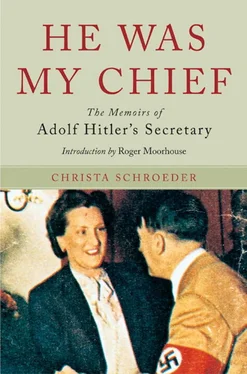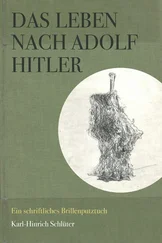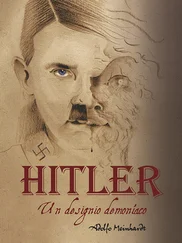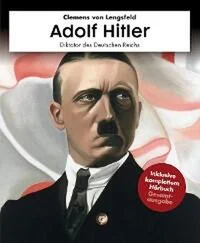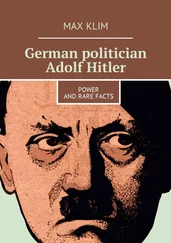Christa Schroeder - He Was My Chief - The Memoirs of Adolf Hitler's Secretary
Здесь есть возможность читать онлайн «Christa Schroeder - He Was My Chief - The Memoirs of Adolf Hitler's Secretary» весь текст электронной книги совершенно бесплатно (целиком полную версию без сокращений). В некоторых случаях можно слушать аудио, скачать через торрент в формате fb2 и присутствует краткое содержание. Город: Barnsley, Год выпуска: 2012, ISBN: 2012, Издательство: Frontline Books, Жанр: История, Биографии и Мемуары, на английском языке. Описание произведения, (предисловие) а так же отзывы посетителей доступны на портале библиотеки ЛибКат.
- Название:He Was My Chief: The Memoirs of Adolf Hitler's Secretary
- Автор:
- Издательство:Frontline Books
- Жанр:
- Год:2012
- Город:Barnsley
- ISBN:978-1-7830-3064-4
- Рейтинг книги:4 / 5. Голосов: 1
-
Избранное:Добавить в избранное
- Отзывы:
-
Ваша оценка:
- 80
- 1
- 2
- 3
- 4
- 5
He Was My Chief: The Memoirs of Adolf Hitler's Secretary: краткое содержание, описание и аннотация
Предлагаем к чтению аннотацию, описание, краткое содержание или предисловие (зависит от того, что написал сам автор книги «He Was My Chief: The Memoirs of Adolf Hitler's Secretary»). Если вы не нашли необходимую информацию о книге — напишите в комментариях, мы постараемся отыскать её.
He Was My Chief: The Memoirs of Adolf Hitler's Secretary — читать онлайн бесплатно полную книгу (весь текст) целиком
Ниже представлен текст книги, разбитый по страницам. Система сохранения места последней прочитанной страницы, позволяет с удобством читать онлайн бесплатно книгу «He Was My Chief: The Memoirs of Adolf Hitler's Secretary», без необходимости каждый раз заново искать на чём Вы остановились. Поставьте закладку, и сможете в любой момент перейти на страницу, на которой закончили чтение.
Интервал:
Закладка:
Hitler was a great admirer of British colonialism. In 1926 he had told his closest colleagues: ‘It is not my wish that a pearl should fall from the crown of the British Empire. It would be a catastrophe for humanity.’ In the prewar years when German public opinion was very favourable towards the Indian independence movement, he said: ‘I forbid my people to go along with this Gandhi nonsense. One does not win independence with spinning wheels, but with guns.’ From several of his statements it was possible to conclude that he thought of an alliance with Britain as the most ideal solution to the problems of world politics. He considered the Royal Navy and the German Army in combination to be a power factor sufficiently strong to give world politics a new foundation. In the 1920s Hitler had begun writing a book about foreign policy. [124] Hitlers Zweites Buch , with a commentary by Gerhard L. Weinberg, Deutsche Verlags-Anstalt, Stuttgart 1961.
In 1939, shortly after the British declaration of war, he said to Hess in my presence: ‘All my work is falling apart. I have written my book for nothing.’ I believe that Hess was the only person to whom he had explained the ideas developed in his manuscript, and that Hess, because of his intimate knowledge of Hitler’s thinking, undertook his flight to Britain.
The Great Hall was often the venue for interesting events, visits and conversations. Hitler was very impressed by the visit of the Duke and Duchess of Windsor. [125] This visit took place on 20 October 1937. HRH the Duke of Windsor had abdicated as King Edward VIII on 10 December 1936.
In the afternoon from the office window I saw Hitler with the couple on the terrace apparently pointing out to them the various mountains by name. The duchess wore a simple dark blue woollen frock of excellent cut. She looked chic and impressive with her hair centre-parted and styled in a bun. Undoubtedly she made a lasting impression on Hitler, for in the evening he said: ‘She would definitely have made a good queen’. He saw in the Duke a friend of Germany and regretted that he had not fought the Establishment rather than abdicating, particularly since he could have relied upon the sympathy of the working class.
That evening at the fireside he also told us of the visit a few days before by the Indian prince and Muslim leader the Aga Khan, one of the richest men in the world. [126] This visit took place on 20 October 1937. The Aga Khan III (b. 2.11.1877 Karachi, d. 11.6.1957 Geneva) was the forty-first imam of the Ismaeli sect.
The conversations with the Aga Khan gave Hitler much food for thought, e.g. the opinion of his visitor that it would have been best for Europe if Martel had lost the eighth-century battle of Tours/Poitiers against the Moors, for then Europe would have become Muslim, retained its scientific knowledge and its peoples would have lived in peace with each other. The Aga Khan had given thought to the European relationship and that pleased Hitler. He found himself in agreement with many non-barbarous aspects of Islam, in particular the ban on drinking and eating the flesh of swine, and the practice of periodic fasting.
Another of the visits by prominent statesmen to the Berghof which Hitler was fond of describing was that by Lloyd George [127] This visit took place on 4 September 1936.
in 1936. He had been impressed by the geographical situation of the Berghof, by the house itself, its furnishings and above all the view from the gigantic window over the mountains. German measures to curb unemployment, reduce working hours and introduce state health insurance, as well as other social advances, also impressed him. Dr Ley had acquainted Lloyd George before his visit to the Berghof with the work of the Arbeitsfront , the official workers’ organisation.
On the other hand the visit of Knut Hamsun [128] Knut Hamsun (b. 4.8.1859 Lom, Norway, d. 19.2.1952 Grimstad). Novelist; 1920 Nobel Prize winner for literature; during the Second World War Nazi sympathiser, member of Norwegian Quisling Party; after the war convicted of collaboration and fined.
to the Berghof left a bad taste in the mouth. This happened in June 1943. During a meal, Baldur von Schirach had mentioned Hamsun’s visit to the Journalists’ Congress in Vienna and urged Hitler to invite the Norwegian to the Berghof. After initial reluctance Hitler agreed and Knut Hamsun came. During the conversation between Hamsun and Hitler, Dara Christian and I heard a heated exchange◦– we were in the lounge, which was separated from the Great Hall only by a curtain. Holding our breath we crept closer. Hamsun had had the gall to take Hitler to task over the measures introduced by Gauleiter Terboven in Norway, urging in emotional tones that Terboven be recalled. Maybe because he was rather deaf, or possibly because Hitler would tolerate no contradiction, we heard Hitler shout at him: ‘Be silent! You know nothing about it!’
Hitler had said precisely the same thing on Good Friday 1943 to Henriette Schirach at the fireplace, she told me in 1978. I remember that evening Eva Braun had sat at Hitler’s right before she went upstairs, and to the left of Henriette. I had also noticed that, while the other guests were talking, an argument developed between Henriette and Hitler, the subject of which was an occurrence in Amsterdam a few days previously. She had been awoken at night by an unusually loud disturbance and had watched from a hotel window as some weeping women were ordered forward across a bridge and disappeared into the night. From her friends she learned next day that this had been a deportation of Jewish women. She promised to bring the matter to the attention of Hitler, which she was now doing. Hitler answered her in a very brusque manner: ‘Be silent, Frau von Schirach, you understand nothing about it. You are sentimental. What does it matter to you what happens to female Jews? Every days tens of thousands of my most valuable men fall while the inferior survive. In that way the balance in Europe is being undermined,’ and here he moved his cupped hands up and down like a pair of scales. ‘And what will become of Europe in one hundred, in one thousand years?’ In a tone which made it evident that he considered the matter closed, he is said to have declared: ‘I am committed by duty to my people alone, to nobody else!’
The guests noticed that Hitler had now become morose, and there was visible relief when a waiter appeared suggesting that he might refill the glasses. Another great sigh of relief went up when just after midnight Dr Goebbels arrived, but it was misplaced, for Goebbels launched at once into a diatribe against Baldur von Schirach, accusing him of fostering Austrian policies in Vienna. Hitler said that it had been ‘a mistake to send Schirach to Vienna, and also a mistake to have annexed the Viennese into the Greater German Reich.’ When Schirach pointed out that ‘the Viennese are all for you, mein Führer ’, Hitler retorted, ‘I am not in the least interested, I reject them.’ At this Schirach declared that under the circumstances he was resigning his post, but Hitler waved this aside by saying: ‘That is not your decision. You will stay where you are.’
Next morning there was a deathly stillness over the Berghof. However this had nothing to do with the departure of the Schirachs, who had driven off in the early hours without so much as a by-your-leave: on Martin Bormann’s orders it was always quiet across the entire Berg every morning because Hitler spent most of the night studying reports and other documents and slept in more or less until noon. All house guests in the floor above his had to pay heed. One had to tiptoe around the bed and not bathe until midday. All guests were also required to make no noise on the terrace, where Eva Braun liked to spend time amongst her friends in a deckchair until Hitler appeared.
Читать дальшеИнтервал:
Закладка:
Похожие книги на «He Was My Chief: The Memoirs of Adolf Hitler's Secretary»
Представляем Вашему вниманию похожие книги на «He Was My Chief: The Memoirs of Adolf Hitler's Secretary» списком для выбора. Мы отобрали схожую по названию и смыслу литературу в надежде предоставить читателям больше вариантов отыскать новые, интересные, ещё непрочитанные произведения.
Обсуждение, отзывы о книге «He Was My Chief: The Memoirs of Adolf Hitler's Secretary» и просто собственные мнения читателей. Оставьте ваши комментарии, напишите, что Вы думаете о произведении, его смысле или главных героях. Укажите что конкретно понравилось, а что нет, и почему Вы так считаете.
